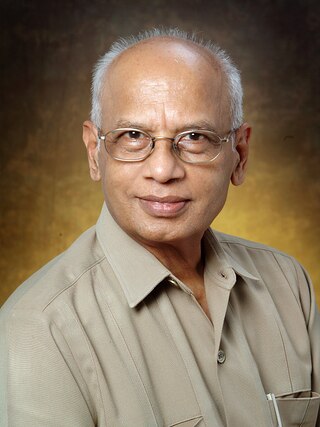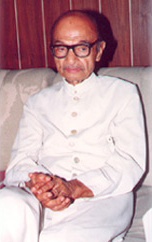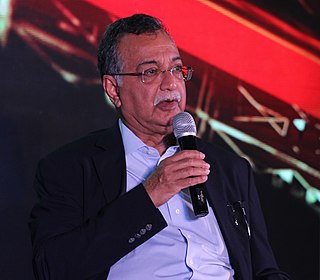
K. M. Cherian, in full Kotturathu Mammen Cherian, is an Indian heart surgeon. He performed India's first coronary artery bypass surgery and first heart Lung transplant. and is considered a pioneer of pediatric cardiac surgery in the country. He is also a former honorary surgeon to the President of India and a Padma Shri awardee.

Marthanda Varma Sankaran Valiathan is an Indian cardiac surgeon. He is a former President of the Indian National Science Academy and National Research Professor of the Government of India.
Ramamurthi Balasubramaniam was an Indian neurosurgeon, author, editor, a pioneer in neurosurgery in India and often recognized as the Father of Neurosurgery of India. He set up the Department of Neurosurgery at the Government General Hospital, Chennai in 1950, the Department of Neurosurgery at the Madras Medical College and founded the Institute of Neurology, Madras in the 1970s. He was awarded the Padma Bhushan and the Dhanvantri Award for his contribution to the field of Neurosurgery in India. He is also a recipient of the Lifetime Achievement Award of Madras Neuro Trust.
Mahdi Hasan was an anatomist from Uttar Pradesh, India.
Akhtarul Wasey is an Indian scholar and academician, who serves as the president of Maulana Azad University, in Jodhpur, India. He formerly served as professor of Islamic Studies at Jamia Millia Islamia in New Delhi, where he remains professor emeritus in the Department of Islamic Studies.

Hakim Syed Khaleefathullah is an Indian physician and the founder of Niamath Science Academy, known for his scholarship and expertise in the alternative medicine system of Unani. He was honoured by the Government of India, in 2014, with the Padma Shri, the fourth highest Indian civilian award, for his contribution to the field of medicine.
Vishwa Kumar Gupta, is an Indian homoeopathic physician and former Principal of the Nehru Homoeopathic Medical College, New Delhi. The Government of India honoured him, in 2013, by awarding him the Padma Shri, the fourth highest civilian award, for his contributions to the field of medicine.
Mansoor Hasan Khan, is an Indian cardiologist, known for his contributions towards the setting up of Lari Cardiology Centre at King George's Medical University, Lucknow. The Government of India honored Hasan in 2011, with the fourth highest civilian award of Padma Shri.
Jugal Kishore (1915–2012) was an Indian homoeopathic physician and the founder Director of Nehru Homoeopathic Medical College and Hospital, New Delhi, a Government of Delhi undertaking. He was honored by the Government of India, in 2012, with the fourth highest Indian civilian award of Padma Shri.

Hakim Abdul Hameed was an Indian physician of the traditional medicine system of Unani, the founder chancellor of Jamia Hamdard, and a former chancellor of Aligarh Muslim University. His ancestors came from Kashgar to the Indian subcontinent, in the reign of the Mughal emperor, Shah Alam. He was the founder and chief trustee of Hamdard Laboratories. He was honoured by the Government of India in 1965, with the award of Padma Shri, the fourth highest Indian civilian award and in 1992, the government awarded him the third highest Indian honour of Padma Bhushan. He was the elder brother of the Hakeem Muhammad Saeed.

Krishna Gopal Saxena (1912–2003) was an Indian homoeopathic physician. Born on 25 September 1912 in Delhi, he did his schooling at Karachi and Ambala and graduated in homoeopathic medicine from the Calcutta Homoeopathic Medical College.
Krishnaswami Srinivas Sanjivi (1903–1994) was an Indian medical doctor, Gandhian, social worker and the founder of Voluntary Health Services (VHS), a medical facility in Chennai reported to be serving the lower and middle-class people of the society. He was honoured by the Government of India in 1971 with Padma Shri, the fourth highest Indian civilian award. Five years later, the government followed it up by awarding him the third highest civilian award of Padma Bhushan in 1976.
Ravivarma Marthanda Varma was an Indian neurosurgeon, one of the pioneers of Indian neurosurgery and the founder director of the National Institute of Mental Health and Neurosciences (NIMHANS). He was the originator of a new surgical procedure for treating Parkinson's disease which later came to be known as Varma's Technique. He was a former Deputy Director General of Health Services, Government of India and an honorary surgeon to R. Venkataraman, former president of India. He was honoured by the Government of India in 1972 with Padma Shri, the fourth highest Indian civilian award.
Dhani Ram Prem (1904–1979) was a naturalized British political activist, social worker and physician of Indian origin. He was the first councillor of Asian origin of Birmingham, representing the Labour Party at Great Barr, in south Staffordshire. He was awarded the fourth highest Indian civilian award of Padma Shri by the Government of India in 1977, making him the first non resident Indian to receive the award.
Mohinder Nath Passey (1934–2002) was an Indian physician, rheumatologist and an honorary physician to the President of India. He secured his graduate and post graduate degrees in medicine from Gwalior and started his career as the Medical Registrar at Irwin Hospital. Moving on to Hindu Rao Hospital in 1964, as a medical specialist, he stayed there until 1985, retiring as the Consultant and Head of the Department of Medicine. After superannuation, he worked with Mahalaxmi Hospital until his death on 30 May 2002. The Government of India awarded him the fourth highest civilian award of Padma Shri in 1991.
Gurumukh Sajanmal Sainani is an Indian general physician, medical researcher, medical writer and an Emeritus Professor of the National Academy of Medical Sciences. He is a former director of the All India Heart Foundation and the incumbent director of Jaslok Hospital, Mumbai. He is a recipient of the highest Indian award in the medical category, Dr. B. C. Roy Award, from the Medical Council of India and the rank of Honorary Brigadier from the President of India. The Government of India awarded him the fourth highest civilian award of the Padma Shri in 2000.

Sanjeev Bagai is an Indian pediatrician and nephrologist known for his proficiency in pediatric nephrology and neonatology. He is chairman of the Nephron Clinic in New Delhi, India. He was a visiting professor of pediatrics at Saint Justin Hospital in Canada and University of Toledo, Ohio and has taught at the University of New South Wales, Sydney.
Shantilal Chhaganlal Sheth (1912–1990) was an Indian pediatrician and the president of several medical institutions including the Medical Council of India, the apex body for matters related to medical administration and education in India. An honorary surgeon commander at the Indian Navy, he served as the honorary physician to the President of India. The Government of India awarded him the third highest civilian honour of the Padma Bhushan, in 1972, for his contributions to medicine.
Indu Bhushan Sinha was an Indian nephrologist and medical academic from the Indian state of Bihar. He is a former professor and head of the department of nephrology at Patna Medical College and Hospital. He has served as the editor of The Patna Journal of Medicine of the Indian Medical Association (1986–89) and is a life member of the Indian Society of Nephrology. The Government of India awarded him the fourth highest civilian honour of the Padma Shri, in 2008, for his contributions to medical science.

H. Sudarshan Ballal is an Indian kidney transplant physician, nephrologist currently director of Manipal Institute of Nephrology and Urology, the chairman of the Medical Advisory Board of Manipal Hospitals Group and Senate Member of Manipal University, now known as Manipal Academy of Higher Education (MAHE).







